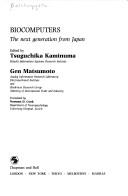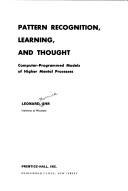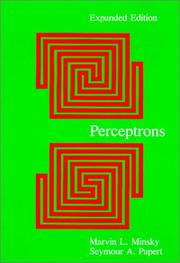| Listing 1 - 6 of 6 |
Sort by
|

ISBN: 0412357704 9780412357701 Year: 1991 Volume: vol *10 Publisher: London New York Chapman and Hall
Abstract | Keywords | Export | Availability | Bookmark
 Loading...
Loading...Choose an application
- Reference Manager
- EndNote
- RefWorks (Direct export to RefWorks)
Computer. Automation --- Automates conscients --- Bewuste automaten --- Bio-senseurs --- Bio-sensoren --- Biomedical detectors --- Biomedical sensors --- Biosensors --- Conscious automata --- Detectors [Biomedical ] --- Electronica [Moleculaire ] --- Electronics [Molecular ] --- Electronique moléculaire --- Moleculaire elektronica --- Molecular electronics --- Sensors [Biomedical ] --- Molecular electronics. --- Biosensors. --- Conscious automata.
Book
ISBN: 9780199737970 0199737975 Year: 2010 Publisher: New York, N.Y. Oxford University Press
Abstract | Keywords | Export | Availability | Bookmark
 Loading...
Loading...Choose an application
- Reference Manager
- EndNote
- RefWorks (Direct export to RefWorks)
General ethics --- Artificial intelligence --- Conscious automata --- Philosophy and cognitive science --- Robotics --- Decision Making --- Autonomy (Philosophy) --- Computers --- Moral and ethical aspects --- Social aspects --- Philosophy --- Decision making --- Artificial intelligence - Moral and ethical aspects --- Artificial intelligence - Social aspects --- Conscious automata - Moral and ethical aspects --- Robotics - Philosophy --- Computers - Moral and ethical aspects --- Computers - Social aspects

ISBN: 0136540953 Year: 1973 Volume: 48 Publisher: Englewood Cliffs, NJ Prentice-Hall
Abstract | Keywords | Export | Availability | Bookmark
 Loading...
Loading...Choose an application
- Reference Manager
- EndNote
- RefWorks (Direct export to RefWorks)
Artificial intelligence --- Cognition --- -Perceptrons --- Neural networks (Computer science) --- Pattern recognition systems --- Self-organizing systems --- Conscious automata --- Psychology --- AI (Artificial intelligence) --- Artificial thinking --- Electronic brains --- Intellectronics --- Intelligence, Artificial --- Intelligent machines --- Machine intelligence --- Thinking, Artificial --- Bionics --- Cognitive science --- Digital computer simulation --- Electronic data processing --- Logic machines --- Machine theory --- Simulation methods --- Fifth generation computers --- Neural computers --- Data processing --- Perceptrons --- Artificial intelligence.
Book
ISBN: 0262527804 0262331829 9780262331821 9780262331838 0262331837 9780262527804 Year: 2015 Publisher: Cambridge, Massachusetts [Piscataqay, New Jersey] MIT Press IEEE Xplore
Abstract | Keywords | Export | Availability | Bookmark
 Loading...
Loading...Choose an application
- Reference Manager
- EndNote
- RefWorks (Direct export to RefWorks)
The idea that human history is approaching a "singularity"-that ordinary humans will someday be overtaken by artificially intelligent machines or cognitively enhanced biological intelligence, or both-has moved from the realm of science fiction to serious debate. Some singularity theorists predict that if the field of artificial intelligence (AI) continues to develop at its current dizzying rate, the singularity could come about in the middle of the present century. Murray Shanahan offers an introduction to the idea of the singularity and considers the ramifications of such a potentially seismic event. Shanahan's aim is not to make predictions but rather to investigate a range of scenarios. Whether we believe that singularity is near or far, likely or impossible, apocalypse or utopia, the very idea raises crucial philosophical and pragmatic questions, forcing us to think seriously about what we want as a species. Shanahan describes technological advances in AI, both biologically inspired and engineered from scratch. Once human-level AI-theoretically possible, but difficult to accomplish-has been achieved, he explains, the transition to superintelligent AI could be very rapid. Shanahan considers what the existence of superintelligent machines could mean for such matters as personhood, responsibility, rights, and identity. Some superhuman AI agents might be created to benefit humankind; some might go rogue. (Is Siri the template, or HAL?) The singularity presents both an existential threat to humanity and an existential opportunity for humanity to transcend its limitations. Shanahan makes it clear that we need to imagine both possibilities if we want to bring about the better outcome.
Artificial intelligence --- Technology --- Conscious automata. --- Brain --- Cerebrum --- Mind --- Central nervous system --- Head --- Artificial consciousness --- Electronic brains --- Intelligent machines --- Mechanical brains --- Synthetic consciousness --- Bionics --- Consciousness --- Cybernetics --- Biocomputers --- Perceptrons --- AI (Artificial intelligence) --- Artificial thinking --- Intellectronics --- Intelligence, Artificial --- Machine intelligence --- Thinking, Artificial --- Cognitive science --- Digital computer simulation --- Electronic data processing --- Logic machines --- Machine theory --- Self-organizing systems --- Simulation methods --- Fifth generation computers --- Neural computers --- Forecasting. --- Psychological aspects. --- Social aspects. --- Computer simulation. --- COGNITIVE SCIENCES/General --- COMPUTER SCIENCE/Artificial Intelligence --- Philosophy and psychology of culture

ISBN: 0262631113 9780262631112 Year: 1988 Publisher: Cambridge, MA : M.I.T. Press,
Abstract | Keywords | Export | Availability | Bookmark
 Loading...
Loading...Choose an application
- Reference Manager
- EndNote
- RefWorks (Direct export to RefWorks)
Apprentissage automatique --- Automatisch aanleren --- Learning [Machine ] --- Machine learning --- Parallel processing (Electronic computers) --- Parallelle verwerking (Computers) --- Perceptronen --- Perceptrons --- Traitement parallèle (Ordinateurs) --- Artificial intelligence. Robotics. Simulation. Graphics --- Computer architecture. Operating systems --- Geometry --- Machine Learning --- Data processing --- Machine learning. --- Parallel processing (Electronic computers). --- Perceptrons. --- Data processing. --- Neural networks (Computer science) --- Pattern recognition systems --- Self-organizing systems --- Conscious automata --- High performance computing --- Multiprocessors --- Parallel programming (Computer science) --- Supercomputers --- Learning, Machine --- Artificial intelligence --- Machine theory --- Géométrie --- Parallélisme (Informatique) --- Informatique --- Geometry - Data processing. --- Computer science --- Artificial intelligence. --- Geometry - Data processing
Book
ISBN: 9781420087956 Year: 2011 Publisher: Boca Raton Taylor and Francis
Abstract | Keywords | Export | Availability | Bookmark
 Loading...
Loading...Choose an application
- Reference Manager
- EndNote
- RefWorks (Direct export to RefWorks)
Biology --- Computer. Automation --- Biocomputers --- 575.08:577.21 --- 576.3 --- 577.21 --- 577.21 Molecular mechanism of coding, storage and realization of inheritance information. Molecular genetics. Molecular biology of the gene --- Molecular mechanism of coding, storage and realization of inheritance information. Molecular genetics. Molecular biology of the gene --- 576.3 General cytology. The cell as a biological system. General plan, chemical composition, physicochemical and molecular properties --- General cytology. The cell as a biological system. General plan, chemical composition, physicochemical and molecular properties --- 575.08:577.21 Genetic engineering, genetic manipulation, recombinant DNA --- Genetic engineering, genetic manipulation, recombinant DNA --- Biochemical computers --- Bioelectronic computers --- Biomechanical computers --- Computers --- Conscious automata
| Listing 1 - 6 of 6 |
Sort by
|

 Search
Search Feedback
Feedback About UniCat
About UniCat  Help
Help News
News